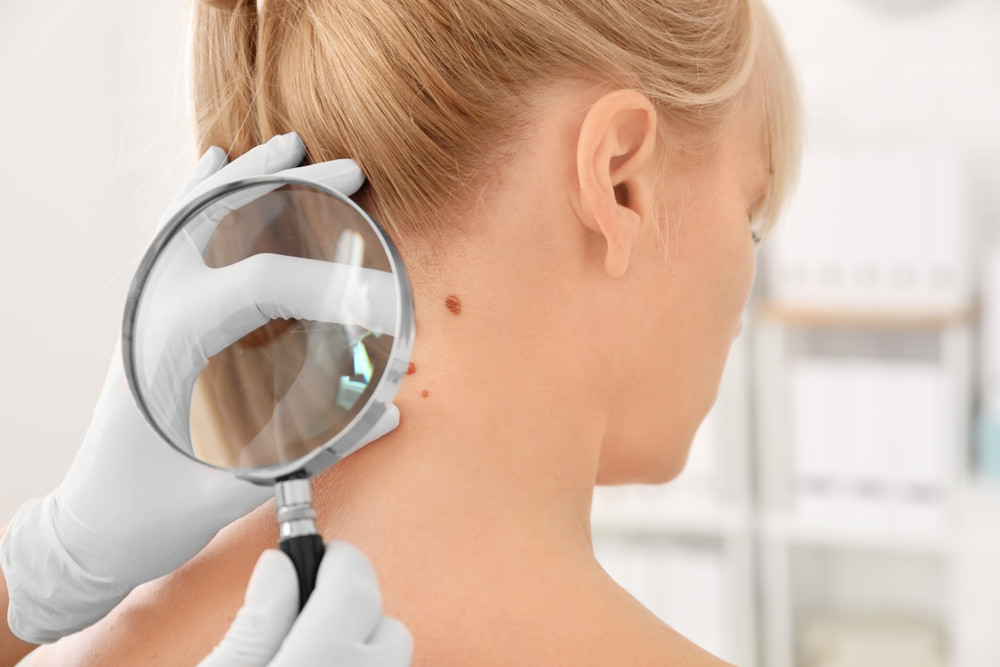
Skin cancer is a prevalent and potentially life-threatening disease that affects millions of people worldwide. It arises from the abnormal growth of skin cells, often due to overexposure to the harmful ultraviolet (UV) rays of the sun. Understanding the different types of skin cancer and their treatment options is crucial for early detection and prevention.
Types of Skin Cancer
Basal cell carcinoma (BCC) is the most common type of skin cancer. It typically appears as a small, shiny bump or a pinkish patch of skin. BCC usually develops on areas exposed to the sun, such as the face, neck, or hands. Although it rarely spreads to other parts of the body, it can cause significant local damage if left untreated.
Squamous cell carcinoma (SCC) is the second most common type of skin cancer. It often appears as a scaly red patch, an open sore, or a wart-like growth. Like BCC, SCC is commonly found on sun-exposed areas of the body. While it tends to grow more aggressively than BCC, it still has a low risk of spreading to other parts of the body.
Melanoma is the most dangerous type of skin cancer. It develops from melanocytes, the pigment-producing cells in the skin. Melanoma can occur anywhere on the body, including areas not exposed to the sun. It often appears as a change in an existing mole or the development of a new, unusual-looking mole. Early detection is crucial for successful treatment, as melanoma can spread rapidly to other organs.
The Importance of Early Detection and Prevention
Early detection plays a vital role in the successful treatment of skin cancer. Regular self-examination of the skin can help identify any suspicious moles or lesions. The ABCDE rule can guide individuals in recognizing potential signs of melanoma: asymmetry, irregular borders, varied colors, diameter larger than a pencil eraser, and evolving or changing appearance. It is essential to consult a dermatologist if any concerning changes are noticed.
Prevention is equally important in reducing the risk of developing skin cancer. This includes practicing sun protection measures such as wearing sunscreen with a high SPF, seeking shade, wearing protective clothing, and avoiding tanning beds.
Additionally, individuals should be aware of their family history of skin cancer and take extra precautions if necessary. Regular dermatologist check-ups and screenings are crucial for early detection and prevention of skin cancer.
The Role of Plastic Surgery in Treating Skin Cancer
Plastic surgery plays a significant role in the treatment of skin cancer, particularly in cases where the cancer has caused extensive damage or is located in aesthetically sensitive areas. Plastic surgeons are trained to reconstruct and restore the appearance of the affected area while ensuring the removal of cancerous cells. This specialized approach is essential in achieving both functional and cosmetic outcomes for patients.
Plastic surgery techniques, such as flap reconstruction and skin grafting, can help restore functionality to areas affected by skin cancer. For instance, if a skin cancer excision results in the loss of a significant portion of the nose, plastic surgery can reconstruct the nose using nearby tissue or cartilage. This allows patients to regain their ability to breathe, speak, and eat normally.
In addition to restoring functionality, plastic surgery can also enhance the aesthetics of the affected area. Skilled plastic surgeons can reconstruct facial features to ensure a natural and symmetrical appearance. This is particularly important for skin cancer located on the face, as it can significantly impact a person's self-esteem and quality of life.
Plastic surgery techniques aim to minimize scarring and achieve the best possible cosmetic outcome. Surgeons use advanced closure techniques, such as layered closure or meticulous suturing, to reduce visible scars. In some cases, they may also utilize laser treatments or other non-invasive procedures to further improve the appearance of scars.
Schedule Your Consultation with Aron Kressel MD Today
Skin cancer is a serious health concern that should not be taken lightly. Understanding the different types of skin cancer and their treatment options is crucial for early detection and prevention. In cases where skin cancer has caused damage or is located in aesthetically sensitive areas, plastic surgery can play a pivotal role in restoring functionality and enhancing aesthetics.
If you notice any concerning changes in your skin or for further guidance on skin cancer treatment options, visit Aron Kressel, MD, at our office in New York, New York. Please call 212-772-6968 to schedule an appointment today.









